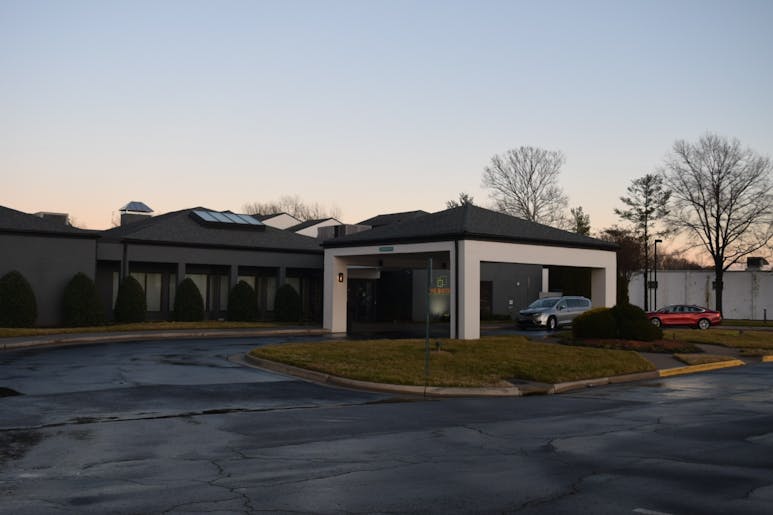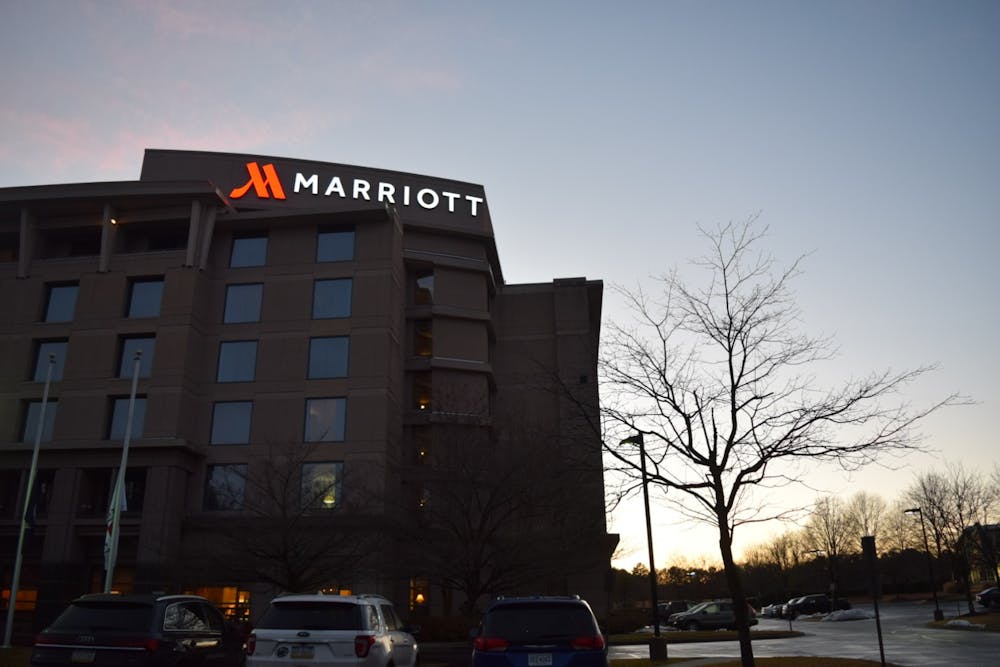The University of Richmond men’s basketball team has been quarantining and isolating in hotels and, at one point, used a shortened quarantine period, players said.
The team has had three pauses in its season for quarantine and isolation purposes – one in early December, one in mid-January and one at the end of January into February. The team’s quarantine and isolation procedures are in contrast with procedures set for other UR students.
The morning of Jan. 27, after the game at Saint Joseph’s University, a member of the basketball program – not a player – tested positive for COVID-19 after feeling ill, said Grant Golden, a fifth-year senior on the basketball team. Players on the men’s basketball team are tested the day before and after each game, said Jacob Gilyard, a senior on the team.
All the players were tested again, but none were deemed close contacts, so they did not quarantine at this point, Golden said.
Two days later a player sidelined by injury tested positive, Golden said. Before testing positive, this player had been using his locker and attending a portion of practice when he was not in the training room for rehab, Golden said. When the injured player was at practice, he was masked and away from the court, Golden said.
No players were deemed close contacts of the injured player, Golden said.
Saint Louis University withdrew from a game against UR scheduled for Jan. 29 because of “differing interpretations of contact tracing,” the Richmond-Times Dispatch reported. Contact tracing processes and close contact definitions can differ among colleges.
Following a positive COVID-19 test result of a staff member, the team went to the Courtyard by Marriott Richmond West on Broad Street on Jan. 30 as a precaution before being tested the next day, Golden said. On Jan. 31, about six or seven players tested positive for COVID-19, starting the team’s quarantine and isolation period, Golden said.

The Courtyard by Marriott Richmond West is located on Broad Street, approximately three miles away from the University of Richmond campus.
During this hotel stay, some members of the basketball team had to quarantine, and others had to isolate. Quarantine keeps close contacts of a person who has tested positive COVID-19 away from others, whereas isolation keeps someone who has tested positive for COVID-19 away from others, according to UR’s COVID-19 Dashboard.
All the players in quarantine were tested again on Feb. 3, and an additional four or five players tested positive for COVID-19, Golden said.
The first group of players who tested positive for COVID-19 left isolation on Feb. 9, Golden said. The second group that tested positive left isolation on Feb. 12, he said. Both groups were isolated for a total of 10 days from the date of their test.
Enjoy what you're reading?
Signup for our newsletter
COVID-19 testing is not used to determine the end of an isolation period, because people who have had COVID-19 can continue to test positive for more than three months after without being contagious, according to the CDC website.
Players who continued to test negative for COVID-19 had to remain in quarantine for 14 days, Golden said.
On Feb. 5, UR had 96 active cases with 36% of on-campus isolation space and 22.5% of on-campus quarantine space occupied, The Collegian reported. This was two days after approximately 10 or 12 players on the basketball team had tested positive for COVID-19, based on the positive test results on Jan. 31 and Feb. 3.
The percentages of isolation and quarantine space occupied only include spaces located on campus, according to the COVID-19 Dashboard data notes. This would not include hotels or off-campus self-quarantine or self-isolation – meaning the basketball players quarantining and isolating in the hotel would not have been counted in the dashboard numbers.
Quarantine and isolation space occupancy rates are among the common metrics colleges use to determine campus shutdown thresholds in the case of a COVID-19 outbreak, Inside Higher Ed reported.
UR currently has 173 quarantine spaces – 77 of which are in contingency – and 136 isolation spaces – 25 of which are in contingency – on campus, Residence Life and Housing Director Patrick Benner wrote in an email. That email was sent to The Collegian by Cynthia Price, director of media and public relations. Benner did not speak to The Collegian directly.
“In contingency” refers to rooms that are available if needed but have not been set up with micro-fridges or TVs.
All the men’s basketball players live on campus, Gilyard said. Normally, students who are living on campus would have the option to quarantine or isolate in on-campus facilities, and if they did so would contribute to the COVID-19 dashboard percentages. Students who choose to quarantine or isolate off-campus typically are not reimbursed for their stays, multiple students who have quarantined off campus said to The Collegian.
The Collegian was unable to confirm whether other athletic teams have been quarantined or isolated off campus.
In early December, some basketball players quarantined in Keller Hall, Golden said. Golden himself spent a couple of days there and thinks issues in Keller prompted the decision to have the team quarantine and isolate in hotels, he said.
“The AC didn’t work; it was like 100 degrees in the room; the bed was too small,” Golden said. “It was just not a good situation. So our coaches really just pushed for them to allow us to go to the hotel.”
The Jan. 31 to Feb. 13 stay was not the first time the team has stayed in a hotel to quarantine and isolate. One player on the men’s basketball team tested positive for COVID-19 and went into isolation on Jan. 10, following a game at George Mason University, Gilyard said. This player stayed in isolation for 10 days at the Richmond Marriott Short Pump, and the rest of the team quarantined there as close contacts, Gilyard said.
All players, aside from the one who initially tested positive for COVID-19, were tested every morning while in quarantine, Golden said.
The players were quarantined for a shortened period following CDC guidelines, Golden said.
The CDC has posted procedures for an alternative seven- and 10-day quarantine period for close contacts of a person who has tested positive. It currently recommends the 14-day quarantine period for close contacts.
Although the basketball players’ shortened quarantine in the Short Pump hotel followed CDC guidelines for shortening quarantine periods, UR has not yet adopted these procedures as an institution.
At UR, isolation is 10 days and quarantine is 14 days, said Wendy Sheppard, assistant director of sports and risk management for university recreation and a member of UR’s COVID-19 response team.
“The university is looking into amending our quarantine length to coincide with CDC guidelines,” Sheppard said.
UR has not adopted the shortened 10-day quarantine period, because UR aims to ensure it is prepared to monitor the process correctly, Sheppard said. The 14-day quarantine period for students cannot be shortened at this time, she said.
After being asked in an interview about whether student-athletes who are a close contact of a positive COVID-19 case are quarantined for 14 days, Ryan Colton, senior associate director of athletic compliance and governance, referred The Collegian to two documents he sent in an email written on Feb. 20.
The documents were a PowerPoint titled “Athletic Department COVID-19 Response Plan” and the “University of Richmond Department of Athletics COVID-19 Impacts Question and Answer Document.” The documents did not specifically outline the length of the quarantine period for student-athletes deemed close contacts.
At this time, as Sheppard noted, public UR policy is that students who are identified as close contacts must quarantine for 14 days with no exceptions.
This appears to contradict Gilyard’s and Golden’s account of members of the basketball team quarantining for fewer than 14 days.
“All decisions regarding quarantine and isolation are made in accordance with University, VDH, CDC and NCAA guidance,” Colton wrote in an email to The Collegian on Feb. 20. “While we do not comment on specific situations, the Department of Athletics has supported student-athletes isolating and quarantining on-campus, at home and in hotels.”
The athletes on the men’s basketball team do not pay for their hotel stays or meals, and managers or coaches provide them with meals during quarantine and isolation periods at the hotels, Gilyard said.
The Collegian could not confirm who is paying for the team’s hotel stays. The student-discounted nightly rate at the Courtyard Richmond West on Feb. 22 was $75.65 before tax – the rate changes by day. The nightly rate at the Richmond Marriott Short Pump, which does not offer a student discounted rate, was $112 on Feb. 22.
Administrative members of athletics do not discuss specifics regarding student-athletes and teams, Colton wrote in an email to The Collegian on Feb. 22. When a cost is incurred for a student-athlete or a team related to COVID-19 isolation and quarantine protocols, it is covered by team-specific funds, Colton wrote.
“These [quarantine and isolation] decisions are made on a case-by-case basis based upon the specific circumstances involved,” Colton wrote on Feb. 20. “Important factors include, but are not limited to, health and wellness, protecting the campus community and return to play considerations.”
Contact contributor Olivia du Bois at olivia.dubois@richmond.edu.
Support independent student media
You can make a tax-deductible donation by clicking the button below, which takes you to our secure PayPal account. The page is set up to receive contributions in whatever amount you designate. We look forward to using the money we raise to further our mission of providing honest and accurate information to students, faculty, staff, alumni and others in the general public.
Donate Now



